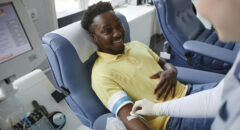
Studies show that Black American men are more prone to certain illnesses. While you may have heard that heart disease is at the top of this list, did you know that cancer is a close second? Even though there have been a lot of advances in medical technology and health, the illnesses that affect Black men haven’t changed significantly. Here’s what you need to know to take care of yourself.
What The Numbers Have To Say
Though Black people make up only 14.4 percent of the population, studies show that they’re more likely to be diagnosed with cancer and die more quickly after the diagnosis. According to the American Cancer Society (ACS), Black Americans can be as much as four times as likely to develop cancer as other ethnicities. They’re also twice as likely to die after they’ve been diagnosed. In fact, one in three Black men are likely to be told they have cancer while one in five of them will die. Based on these numbers, the ACS estimates that there will be 299,010 new cases of Black men with prostate cancer in 2024 and approximately 35,250 of them will not survive.
The Types Of Cancer You Need To Check For
Your overall risk for cancer is indeed higher as a Black man, but that risk isn’t equal across the board. The latest statistics show that there are 10 types of cancer that you need to look out for. These are the ones you’re more likely to be diagnosed with:
- Prostate
- Lung and bronchus
- Colon and rectum
- Urinary
- Melanoma
- Kidney and renal pelvis
- Non-Hodgkin lymphoma
- Oral cavity and pharynx
- Leukemia
- Pancreas
When it comes to dying from cancer, however, the order of the diseases changes.
- Lung and bronchus
- Prostate
- Colon and rectum
- Pancreas
- Liver and intrahepatic bile duct
- Myeloma
- Leukemia
- Esophagus
- Non-Hodgkin lymphoma
- Brain and other nervous system
To make matters more interesting, studies show that the increased risk for cancer isn’t always related to your lifestyle.
For example, Black men may smoke as much as or even less than other ethnicities but still have the highest risk of lung cancer.
In some cases, the cause can be more complicated. Colon cancer can be linked to being overweight and statistics show that many Black men aren’t maintaining a healthy weight.
However, research shows that your risk of developing this type of cancer may be more rooted in your genetics than your weight.
RELATED: 9 Cancer Clues Men Ignore
How To Reduce Your Risk For Cancer
Regardless of the type of cancer that you’re dealing with, there’s one thing you need to bear in mind about reducing your risk. Early detection is the key to having the best outcome.
It is recommended that you see your doctor regularly for a check-up. It’s more likely for your doctor to pick up on what’s happening with you with scheduled visits. During these visits, it’s important to be open about any symptoms you’re having as some illnesses can be harder to pinpoint.
Prostate cancer, for example, might not show its characteristic symptoms until the tumor is of a certain size. Some of the signs you can look out for include needing to urinate frequently, feeling as if your bladder hasn’t been emptied, having a weak flow of urine, and seeing blood in your urine. In this case, it’s best to consult with a doctor as soon as you notice any changes in how often you use the bathroom.
Additionally, you can address lifestyle habits that may contribute to your risk. They might not be the entire cause of the illness, but it’s possible for them to increase the likelihood of you developing certain types of cancer.
If you smoke, it’s a good idea to stop as soon as possible.
It’s also best to include more fresh fruits and vegetables in your diet while staying away from refined sugars, processed foods, and foods that are high in fat.
With regular exercise, it will be possible to maintain a healthy weight.
The statistics might paint a grim picture, but you can still take care of yourself by eating well, exercising regularly, and making specific lifestyle changes. It’s important to get checked regularly and consult a doctor if you notice changes in your health. If you’re diagnosed with cancer, make sure to adhere to your treatment program. Many people have successfully undergone treatment and live full lives after a diagnosis.








